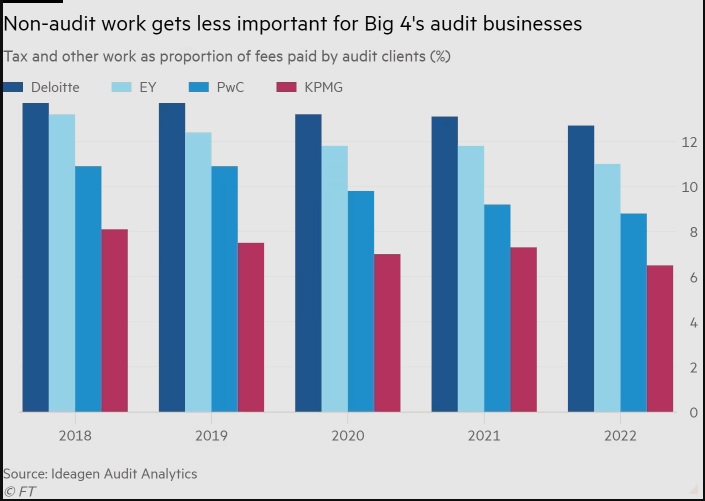PwC to curtail consulting work for US audit clients to reduce conflict risk
London, September 10, 2023
New independence policies are challenge to other Big Four accounting firms
PwC is planning to give up tens of millions of dollars of consulting work for its US audit clients to reduce the risk of conflicts of interest, challenging its rival Big Four firms to follow suit.
The accounting firm has begun to tell clients it will stop offering them some advisory services, even though they are permitted under US rules, as part of a wider revamp of its audit work.
The move comes amid a worldwide debate over how to ensure accounting firms remain independent of the companies they audit, after scandals such as the collapse of Carillion in the UK. It follows an abortive attempt by PwC’s Big Four rival EY to spin off its consulting arm. The UK accounting regulator has already pushed the biggest accounting firms to make their audit operations in the country more independent of their consulting arms.
PwC’s US leaders have agreed a package of reforms that also include the introduction of clawback provisions in their executive pay and the promise of new disclosures about how the firm manages conflicts of interest.
The moves are designed to head off concern among clients, whose directors and shareholders are increasingly scrutinising potential conflicts, and to improve the reputation of a profession that has found it harder to attract young people.

PwC first floated the idea of all the large accounting firms acting together via an industry group called the Center for Audit Quality, according to three people familiar with the discussions, but it did not get cross-industry backing for its ideas.
“We have really good competitors but what they do is up to them,” said Tim Ryan, senior partner of PwC US.
The US drastically curtailed the consulting work accounting firms can do for audit clients in the Sarbanes-Oxley Act, passed in 2002 after the Enron scandal. However, the rules still allow for more non-audit services than allowed in other parts of the world, particularly Europe.
“Sarbanes-Oxley was not proactive,” Ryan said. “It happened as a result of a breakdown in our capital markets. The reality is there’s room for improvement in our profession, both in substance and in appearance, and there’s things that we need to think about proactively.”
Ryan said the foregone services total up to $100mn annually in fee income, from work such as assessing a company’s non-financial systems or giving advice on strategic plans.
“There was a perception that we do a lot of consulting work for our audit clients,” he said. “We have no desire to be close to the line.”
Non-audit work accounts for a smaller proportion of the fees PwC gets from its US audit clients than it does at Deloitte and EY, according to public disclosures collated by Ideagen Audit Analytics.
The Big Four sold $1.5bn of tax and miscellaneous consulting services to their US-listed audit clients last year, on top of $13.5bn of audit and audit-related fees, the figures show. The proportion has been trending down for most of the past two decades.
The move by PwC US is limited to miscellaneous consulting and would not affect tax work, it said. It could affect its consulting revenues outside the country, if its local member firms work for overseas subsidiaries of US audit clients. The work would be phased out by 2025, PwC said.
Details were due to be announced in May but the launch was pushed back while the firm dealt with a scandal in Australia in which partners were revealed to have misused confidential information about the government’s tax plans, according to people familiar with the situation.
The package of 12 policies, which will be rolled out over the next three years, is also likely to be taken up by PwC member firms in other countries, Ryan said.
One of the first measures to be implemented will be pay clawback provisions for the seven members of the PwC US leadership team, which will be activated in the event of ethics scandals or other firm-wide failures.
PwC US will also next year introduce new audit procedures to improve the detection of fraud and to broaden the range of factors staff must consider when ruling on whether a client is at risk of bankruptcy.
Other measures include expanding the audit report that is published with its US clients’ annual report, which will from 2025 be modelled on the UK, where additional disclosures are required about contentious issues an audit has raised.
[The Financial Times]

